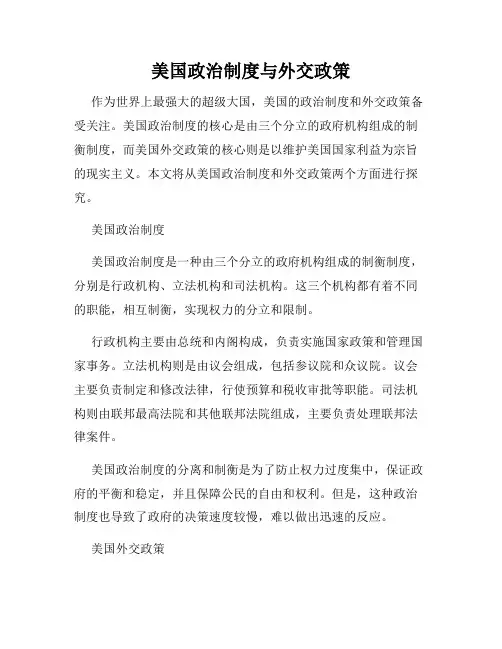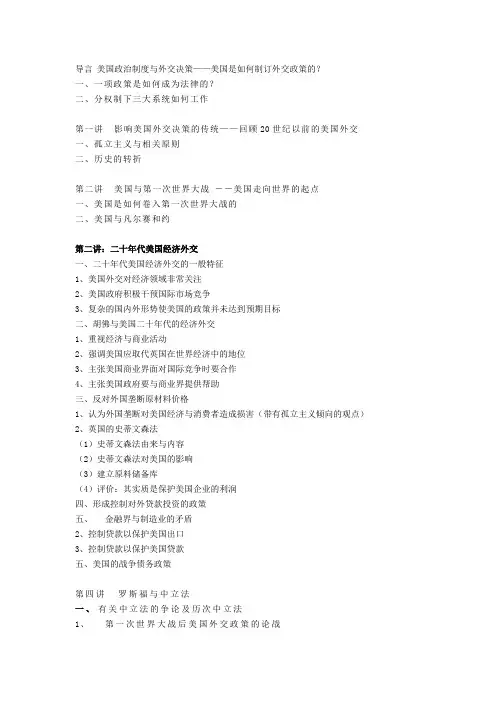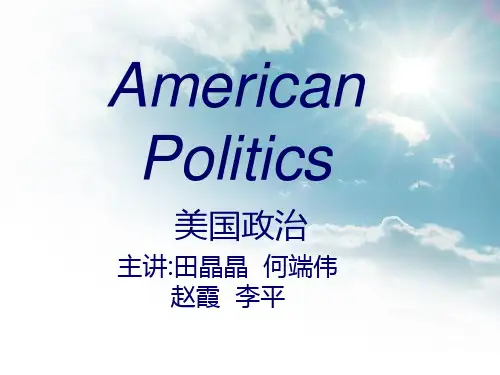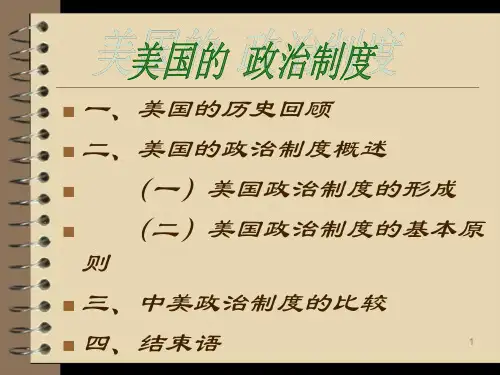美国政治与外交六PPT课件
- 格式:ppt
- 大小:465.50 KB
- 文档页数:14




美国政治制度与外交政策作为世界上最强大的超级大国,美国的政治制度和外交政策备受关注。
美国政治制度的核心是由三个分立的政府机构组成的制衡制度,而美国外交政策的核心则是以维护美国国家利益为宗旨的现实主义。
本文将从美国政治制度和外交政策两个方面进行探究。
美国政治制度美国政治制度是一种由三个分立的政府机构组成的制衡制度,分别是行政机构、立法机构和司法机构。
这三个机构都有着不同的职能,相互制衡,实现权力的分立和限制。
行政机构主要由总统和内阁构成,负责实施国家政策和管理国家事务。
立法机构则是由议会组成,包括参议院和众议院。
议会主要负责制定和修改法律,行使预算和税收审批等职能。
司法机构则由联邦最高法院和其他联邦法院组成,主要负责处理联邦法律案件。
美国政治制度的分离和制衡是为了防止权力过度集中,保证政府的平衡和稳定,并且保障公民的自由和权利。
但是,这种政治制度也导致了政府的决策速度较慢,难以做出迅速的反应。
美国外交政策美国外交政策是以维护国家利益为宗旨的现实主义政策。
这种政策强调在国际关系中制定决策时必须站在国家利益和力量平衡的角度出发,不断扩大和保护国家利益。
美国外交政策在不同的历史时期都有着不同的重心和优先级。
在20世纪20年代和30年代,美国外交重点是执行孤立主义政策,避免参与欧洲战争。
而在20世纪40年代和50年代,美国的外交政策重点转移到了遏制共产主义和推广民主的冷战时期。
在90年代,美国的外交重心又从冷战转向了推动全球自由贸易。
当前,美国的外交政策主要围绕维护国家安全、促进全球经济稳定和推广民主展开。
美国在多个国际组织中发挥着重要作用,如联合国、北约等。
同时,美国也通过自身军事实力和外援政策来实现自己的外交目标。
总结作为世界上最强大的超级大国,美国的政治制度和外交政策对全球都有着深远的影响。
美国政治制度的制衡和分权体现了民主制度的优越性,但也存在着决策效率低下的问题。
而美国外交政策一直坚持以维护国家利益为出发点,各个时期面临的挑战和重心也不断变化。

导言美国政治制度与外交决策——美国是如何制订外交政策的?一、一项政策是如何成为法律的?二、分权制下三大系统如何工作第一讲影响美国外交决策的传统——回顾20世纪以前的美国外交一、孤立主义与相关原则二、历史的转折第二讲美国与第一次世界大战--美国走向世界的起点一、美国是如何卷入第一次世界大战的二、美国与凡尔赛和约第二讲:二十年代美国经济外交一、二十年代美国经济外交的一般特征1、美国外交对经济领域非常关注2、美国政府积极干预国际市场竞争3、复杂的国内外形势使美国的政策并未达到预期目标二、胡佛与美国二十年代的经济外交1、重视经济与商业活动2、强调美国应取代英国在世界经济中的地位3、主张美国商业界面对国际竞争时要合作4、主张美国政府要与商业界提供帮助三、反对外国垄断原材料价格1、认为外国垄断对美国经济与消费者造成损害(带有孤立主义倾向的观点)2、英国的史蒂文森法(1)史蒂文森法由来与内容(2)史蒂文森法对美国的影响(3)建立原料储备库(4)评价:其实质是保护美国企业的利润四、形成控制对外贷款投资的政策五、金融界与制造业的矛盾2、控制贷款以保护美国出口3、控制贷款以保护美国贷款五、美国的战争债务政策第四讲罗斯福与中立法一、有关中立法的争论及历次中立法1、第一次世界大战后美国外交政策的论战2、1935年临时中立法3、1936年中立法、1937年中立法二、1939年中立法与美国国会政治第五讲杜鲁门主义与遏制战略一、杜鲁门政府外交政策的背景1、雅尔塔体制2、美国继续维护雅尔塔体制的困难3、美国国内形势二、凯南的遏制战略与杜鲁门主义1、杜鲁门主义的提出2、杜鲁门主义的理论基础--遏制战略3、再谈杜鲁门主义(这是遏制战略的第一次运用)4、马歇尔计划与遏制战略5、政府内外的不同意见三、美国全球遏制战略的形成1、冲击美国外交政策的一些重要事件2、NSC 68号文件3、朝鲜战争与美国全球遏制战略的形成3、朝鲜战争与美国全球遏制战略的形成4、在全球遏制战略问题上的争论5、共和党的态度五总结和评价遏制战略1、杜鲁门时期奠定了以后美国外交和战略的基本原则--遏制战略的地位。






Animals deserve to be treated humanelyThe animal rights movement is the logical successor to the other major social justice movements of the second half of the 20th century: the civil rights movement, the women‟s rights movement and the gay rights movement.What makes us think that we own animals? How do we claim to be most intellectual and intelligent animal? Don't we have any kind of duties to the fellow beings? If you wouldn't eat cow or a dog then why eat a goat? Why shouldn't animals have right? If they didn't harm us then why should we act selfish? These are the most common question that would be asked by an animal activist. Most of us grew up eating meat or raising pets as a hobby. We wear woolen or silk clothes and even leather. We even go to zoos or circuses for entertainment. We consider that animals are the things to be owned or used directly or indirectly. Infact the grammer advices us to use, "it," pronoun to indicate animals. We feed upon them and use their heads or any parts as a decorating asset to our sweet home. Don't we realize the affect or pain that the individuals have gone through our actions? Our short moment pleasure destroys the life of an animal or even more.Before further discussion about the issue, the definition of animal rights should be made in advance: Animal rights are rights, primarily against being killed and being treated cruelly, that are thought to be possessed by higher non-human animals and many lower ones by virtue of their sentience. Even advocators of animal rights all agree on this definition, they can still be classified into two groups according to their philosophical approaches towards the issue: the consequentialists and the deontologists, the former one exemplified by Peter Singer and the latter one by Tom Reagan.Jeremy Bentham (1748-1832), the founder of the reforming utilitarian school of moral philosophy, stated that when deciding on a being's rights,“The question is not, …Can they reason?' nor, …Can they talk?' but, …Can they suffer?'” In that pass age, Bentham points to the capacity for suffering as the vital characteristic that gives a being the right to equal consideration. The capacity for suffering is not just another characteristic like the capacity for language or higher mathematics. All animals have the ability to suffer in the same way and to the same degree that humans do. They feel pain, pleasure, fear, frustration, loneliness, and motherly love. Whenever we consider doing something that would interfere with their needs, we are morally obligated to take them into account. Do animals have rights? The answer is obviously, yes.The consequentialist, especially Peter Singer, following utilitarianism, argues for statements which can be drawn as conclusions as that interests are predicted on the ability to suffer, and nothing more, and once it is established that a being has interests, those interests must be given equal consideration based not on a description but on a prescription. In my opinion, this utilitarian approach is flawed in aspects as follows.In essence, the doctrine of act utilitarianism is questionable, making the entire argument suspicious. According to utilitarianism, the well-being of a group, instead of well-being of individuals are concerned. As Julian H Franklin, Professor Emeritus of Government at Columbia University, mentioned, following this doctrine, infanticide would become justified as long as better infant “would replace the …inferior‟ one”. Moreover, based on doctrine of utilitarianism, as long as an act would not lead to adverse result, it is justified. Following the doctrine, killing would not be evil as long as it is painless, and experiment on animals would be humane as long as narcotic analgesics are used.Furthermore, interest, the key concept in Singer‟s argument, is obscure and unconvincing in its definition. According to him, “Interests are predicted on the ability to suffer”. Since plants can suffer, in manifestations different from those of us and animals, shall we give them an “equal consideration”? If we should bestow the consideration on them, then “Animal Rights” should be replaced by “Beings Rights”.In contrary to the consequentialist, the deontologist, represented by Tom Reagan, believes that whatever the consequence is, animals have inherent rights. They argue that “because the moral tights of humans are based on their possession of certain cognitive abilities and because these abilities are also possessed by at least some non-human animals, such as animals must have the moral rights as humans.”Even assuming that Reagan‟s selection range is appropriate, suspicions can still be raised from whether cognitive abilities are possessed by non-human animals. Even though numerous experiments have been conducted on this issue; no result has confirmed that non-human animals have exact cognitive abilities as human beings do. If animals do not have such abilities, they can never become “subjects-of-a-life”.Moreover, even if all of Reagan‟s statements are proved to be correct, it will raise discrimination among a nimals. Following Reagan‟s theory, only a fraction of the animal community can gain rights. Human race will seem to be partial to certain species that are like ourselves and discriminate against other species. This will be an ironic result when the intentioned result is to diminish discrimination.Even if it is granted that two approaches mentioned above can be justified philosophically, the concept “animal rights” itself remains suspectable.One reason that is commonly quoted is that rights can solely be applied to human beings. Since rights and obligations are always correlated, anyone who enjoy rights but cannot fulfill corresponding obligations cannot become real rights bearer. It makes no sense that animals should become the privileged.Even we award an imals with such a privilege, we should still distinguish between one‟s owninterest and what is right, according to Carl Cohen, professor of philosophy at the University of Michigan and the University of Michigan Medical School. In fact, most Animal protectors tend to behave and argue following their empathy. Thus, it is not the animal rights itself but human being‟s desire to express their empathy that gives rise to the debate of animal rights.In conclusion, the two dominant philosophical approaches towards animal rights are unconvincing, so is the term “animal right” itself. Hence, the current concept of animal rights is invalid. Further studies and modifications should be made to it in order to make sure that it can be used as a solid weapon in animal protection.Reference:1. Wikipedia, item “Animal Rights”./wiki/Animal_rights2. Britannica Concise Encyclopedia3. Political Dictionary4. Philosophy Dictionary。
奥巴马时代美国的政治与外交政策任职两届总统期间,奥巴马一直致力于推动美国的政治和外交政策。
他的职业生涯中有着太多的经历,因此,他对于国内和国际问题上有着深刻的认识和见解。
相比其他美国总统,奥巴马的外交政策更加注重对于其他国家和国际组织的尊重,并且力求达到和平共存和合作共赢的目标。
同时,他还着重加强同盟国家的关系,展示了前所未有的美国领导力和威望。
下面将从几个方面分析奥巴马时代的美国政治与外交政策。
奥巴马时代的国内政策奥巴马当选总统时,美国正处于经济危机和战争阴影下。
他上任后,迅速采取了一系列的经济和社会政策,旨在促进美国的经济复苏和发展。
首先,他推动了医疗改革。
奥巴马总统认为,让每个美国公民都能够享受到基本的医疗保障是一个国家的责任。
他致力于建立全民医保制度,并且向每个美国公民提供保险。
虽然在实践中,这项政策遭到了一些批评和质疑,但是它为美国历史上的医疗保险奠定了基础。
其次,奥巴马在经济方面采取了积极的政策。
他推动并制定了大规模的财政刺激计划,以挽救美国经济。
这项计划主要包括对于基础设施的投资、税收政策的调整和对于失业人员的援助等等。
奥巴马时代的外交政策在奥巴马的国际事务政策中,他更加注重与其他国家之间的合作与互利。
他认为,美国应该在国际舞台上担负起更多的责任,并且通过合作,共同投身于全球性的解决方案中。
首先,奥巴马的对外贸易政策是非常重要的一环。
他通过谈判达成了“跨太平洋伙伴关系协定(TPP)”和“跨大西洋贸易与投资伙伴关系(TTIP)”等经济协议。
这些协议展示了美国与其贸易伙伴之间愈加密切的关系,并且为美国的品牌拓展提供了更广阔的平台。
其次,奥巴马在打击恐怖主义方面发挥了重要作用。
他推动了多项国际安全合作,在打击恐怖主义组织、维护世界和平中发挥了至关重要的作用。
奥巴马的军事政策也是一部分,他在平民伤亡方面比前任总统更加谨慎、慎重。
再次,奥巴马强调人文和文化交流。
他认为,通过文化交流可以让人们更加深入了解彼此,并且为了更好地建立和谐的合作关系而进行协商和合作。